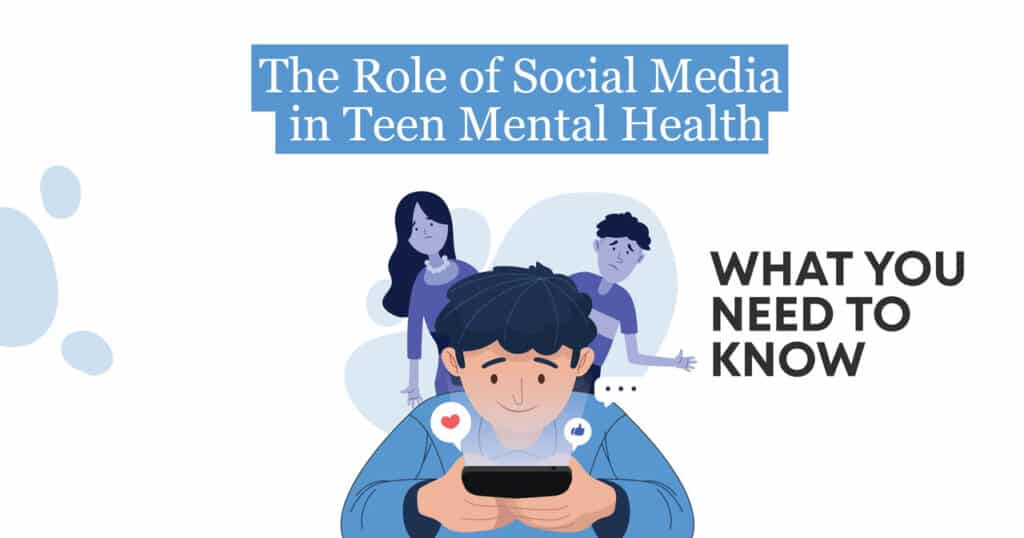Social media has transformed how most teens communicate. Since Instagram, TikTok, and Snapchat are ruling their lives, the digital world dominates how teenagers think, act, and feel. As much as there are all these opportunities for creativity, connection, and expression through social media, there are also adverse effects that influence mental health.
So, this blog post will present detailed reflections on the effects of social media on teens in terms of advantages versus disadvantages, as well as some recommendations on healthy use.
How Social Media Affects Teen Mental Health
Social media penetrates every aspect of teenagers’ lives, wielding a tremendous influence on mental health. It has both promise and potential pitfalls, which can only be overcome when its two-edged impact is understood. A balanced perspective can guide healthier use and relationships with technology.
Positive Impacts of Social Media on Teens
- Fostering Connections
One of the most apparent benefits is that social media can bridge the distance between people. A teen may live across towns or continents, yet she will maintain contact with her family and friends. Most programs developed today, especially WhatsApp, Zoom, or Snapchat, easily keep everyone in touch through video calls, instant messages, or group chats.
For introverted teenagers or those who cannot connect well with people face to face, social media provides an easy way to build strong friendships. This option can decrease degrees of isolation and loneliness, which are critical in maintaining good mental health.
- Access to Supportive Communities
Teens can find relevant supportive social media communities aligned with their identities or specific interests. So, for example, for LGBTQ+ teens, groups can be found that validate and understand them, while for others who have a battle related to mental health issues, similar people in the same boat join as friends for a common goal of discussing problems.
For example, cyberspace often serves as a judgment-free space where youth may share topics they wouldn’t be interested in discussing in real life. Other examples of supportive communities include fans or gaming forums and narrow-hobby forums that produce a sense of belonging together.
- Encouraging Activism and Awareness
Social media has amped up the voices of today’s teens over global and local issues, and they have deeply become passionate about different causes. From climate change awareness and social movements to mental health, bringing people closer, and pleading for change, social media gives the platform to teens.
This type of activism can become very empowering, allowing them to feel part of something greater than they used to. There is also a sense of purpose because one gets to relate with like-minded people on causes they are passionate about.
- Cultivating Creative Expression
For example, an entertaining hub like TikTok, Instagram, or YouTube inspires adolescents to express their latent talents through art, music, storytelling, or video recording. Social media inspires creativity and provides ways for teenagers to experiment with new channels for expression.
Posting their creations online and getting positive reinforcement can also empower many online-by-productive youth to have confidence in their abilities and, therefore, be encouraged to produce more. This productive effort balances out more passive consumption in the minds of teenagers, who now have something productive to focus on.
Negative Impacts of Social Media on Teens
Despite these advantages, the influence of social media on teens also has significant drawbacks to their mental health and emotional development.
- Unrealistic Comparisons
Social media often shows the highlight reels of people’s lives, which provokes most teens to compare themselves to what is framed as the ultimate achievements, beauty, and joy. This can result in reduced self-esteem and lowered self-concept.
- Increased Anxiety and Stress
From being afraid of missing out to maintaining the look online, fear of social media and anxiety in teens are increasingly woven together. Constant flooding of the notifications and pressures to keep up make this chronic stress.
- Risk of Cyberbullying
Cyberbullying is not like traditional bullying. It tracks into a teen’s personal space where they are with their devices. Repeated exposure can be a deep wound in their psyche.
- Addiction to Digital Interaction
They often sink deep into social media addiction with study patterns that can be characterized as excessive screen and constant scrolling habits with daily lifestyles as they gradually substitute meaningful face-to-face interactions with others.
- Poor Academic and Emotional Focus
Spending too much of their time on social media results in reduced academic performance, sleep quality, and attention span. Teens may give more importance to social media than important aspects of life due to various negative implications for their mental and physical health.
Signs Social Media May Be Affecting a Teen’s Mental Health
Detection of symptoms of unhealthy mental health and social media use is something that has to be intervened. These include:
Behavioral Signs
- Excessive Device Use
Constantly checking notifications, posting statuses, or browsing feeds serves as an apparent indicator of an excessive dependency on social media.
- Avoidance of Real-Life Interactions
Teenagers dependent on social media tend to avoid spending much time with family members or close friends due to reduced face-to-face conversations and group activities.
- Neglecting Responsibilities
Another indicator of an unhealthy balance would be that a person’s use of social media ignores school work, domestic chores, or hobbies.
Emotional Indicators
- Increased Irritability or Mood Swings
Teenagers react emotionally depending on the nature of the online interaction. They respond emotionally with anger due to an adverse comment or sorrow because they feel left out.
- Signs of Anxiety or Depression
Suppose this later becomes the stress or sadness that hangs within social media. In that case, it may result in anxiety or depression in teenagers, characterized by persistent worry or feelings of fatigue or possible withdrawal.
Benefits of Limiting Social Media Use for Teen Mental Health
Establishing boundaries with the world of social media can avoid negative influences while fostering their benefits.
| Reduced Stress and Anxiety | Compared to giving into comparison-oriented content, teens would now be relieved from forces outside control, so focusing on their strengths. |
| Improved Focus and Productivity | Time away from screens can now be diverted toward studies, hobbies, or quality time spent with family, meaning overall growth in the matter. |
| Strengthened Real-Life Connections | Decreased social media usage spends more time with loved ones and strengthening and interconnecting relationships. |
| Better Sleep Patterns | Reduced screen time, especially at night, will ensure healthy sleep patterns in teenagers as healthy sleep patterns affect their emotional and physical health. |
Tips for Healthy Social Media Use for Teens
Balancing teen mental health and social media thus demands intentional habits.
- Create Time Limits
- Help with app timers on screen time to create time limits.
- Set time limits for meals or study hours during which the devices are not allowed.
- Encourage Mindful Following
- Follow accounts that give inspiration or education on growth.
- Unfollow pages and profiles, often when they spread negativity or unrealizable ideas.
- Promote Digital Breaks
- Set weekly or monthly digital detox periods.
- Encourage hobbies or outdoor activities as screen-free activities.
- Discuss Cyberbullying Openly
- Offer the adolescent a safe environment to share their online experiences.
- Educate them on how to block, report, and avoid destructive exchanges.
- Model Responsible Social Media Use
- Parents and adult caregivers can model responsible use of social media by their judicious use of screen time and by setting a sense that value can be found off the screen in relationships.
Conclusion
Social media holds immense power in shaping teen experiences, offering opportunities for connection, learning, and self-expression. However, it also presents risks that can negatively impact mental health if not managed responsibly. By understanding the benefits and risks of social media and fostering healthy habits, teens can enjoy a balanced and positive relationship with technology.
With increased awareness, parents, educators, and teens can take steps to reduce social media’s harmful effects on teens while amplifying its advantages. If you or a teen in your life struggles with maintaining a healthy relationship with social media, consider seeking professional guidance or implementing strategies to create healthier habits.
Call to Action
Ready to help your teen build a healthier connection with social media? Start today by implementing these tips or contacting professionals who can provide additional support. For personalized guidance, contact us now!
FAQs
- How does social media affect teen mental health?
Social media can impact teen mental health both positively and negatively. On the positive side, it fosters connections, promotes creativity, and offers access to supportive communities. On the negative side, it may lead to anxiety, depression, cyberbullying, and addiction when used excessively or unhealthily.
- What are some signs that social media is negatively affecting a teen?
Signs include excessive screen time, avoidance of real-life interactions, neglecting responsibilities, mood swings, irritability, anxiety, or symptoms of depression. Teens may also exhibit lower self-esteem and increased dependence on online validation.
- What are the benefits of limiting social media for teens?
Limiting social media use can reduce stress and anxiety, improve focus and productivity, enhance sleep quality, and strengthen real-life connections. It helps teens establish healthier boundaries and promotes better emotional well-being.
- How can teens use social media responsibly?
Teens can use social media responsibly by setting time limits, following positive accounts, taking regular digital breaks, and openly discussing issues like cyberbullying. Encouraging offline activities and modeling responsible behavior are also effective strategies.
- What should parents do if their teen shows signs of social media addiction?
Parents can start by having open, non-judgmental conversations about their social media use with their teens. Establishing clear boundaries, encouraging offline hobbies, and seeking professional guidance when necessary can help address social media addiction in teens effectively.




